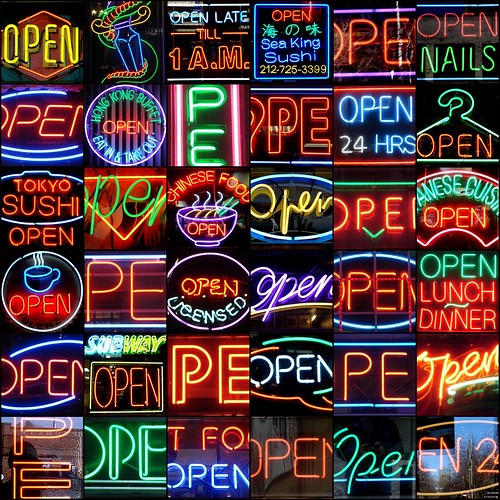
For a couple years now, I’ve been puzzling over the intersections between Open Educational Resources (OER) and open learning. While they have much in common, they clearly aren’t the same thing.
OER are “teaching, learning, and research resources that reside in the public domain or have been released under an intellectual property license that permits their free use and re-purposing by others.” (Hewlett Foundation, 2012) More simply put, they are resources that are public domain or licensed under a license that allows alteration and redistribution, like Creative Commons CC BY.
Open learning is a much broader idea. It is about transparency and sharing and inclusive access and agency and collaboration. It is a mindset, a way of being, doing, and learning. For more about working and learning in the open, I’d recommend the Hive Research Lab’s recent white paper, “What does it mean to ‘Work Open’ in Hive NYC? A Vision for Collective Organizational Learning.” This paper talks about why working in the open is relevant to their organization. It further describes what working in the open looks like in practice and talks about the benefits and tensions.
I believe that OER and open learning can reinforce and encourage one another (separate post to come on that), but it is more and more apparent that they are different things, and with there only being so many hours in the year, sometimes one has to prioritize.
One of the first times this dichotomy became very clear to me was at a gathering of renowned OER advocates. The group was asked to think of a moment of amazing learning, whether in or out of school, and to share it. Listening to a number of powerful stories of learning, it occurred to me that not one of them involved materials or resources (and this was at a gathering about open educational RESOURCES). Instead, they were all about people and experiences. That is certainly in line with my own experiences and beliefs that instructional materials are far down the list of things that matter in fostering learning.
My own thinking on this further developed as I began working with some very progressive educators in some non-traditional learning contexts (including a few connectivist MOOCs). Many of these brilliant folks were committed to “open,” but were not really concerned with open licensing, which seemed to them at best to be an unnecessary inconvenience and at worst a hindrance to what they were trying to do. (I’m not saying I completely agree with this, but it made me think.)
Then there is the path that OER seems to be taking, especially in K-12. In many cases, it is leaning more toward textbooks than non-traditional materials, more toward rigid online courses than unstructured learning spaces, more toward “resources” than processes, more toward attempts to standardize and assess than to foster authentic learning. I understand that this is the direction that K-12 education has moved in, and many think that in order for OER to gain mainstream K-12 adoption, it too must go in this direction.
But this isn’t why I got into OER. My reasons had to do with empowering teachers and students, offering an alternative model of learning. I was hoping for a different and better way to learn, not just a cheaper or more fiscally equitable way to do the same old thing.
And as I think about the challenges of districts adopting OER and the expense involved in trying to beat commercial publishers at their own game, I wonder if embracing open learning (and/or deeper learning?) might be a more fruitful way to advance the open movement. I certainly don’t doubt that it would benefit K-12 students more.

Reflecting on my year of open – part 4/Open learning vs OER http://t.co/w4sgHlEVgs
Reflecting on my year of open – part 4/Open learning vs OER http://t.co/lGtMw40kqW
Reflecting on my year of open – part 4/Open #learning vs #OER http://t.co/p3oHoA2Adr
Should OERs just replace txtbks, or change the way Ss learn? Thanks for sharing @fundmc01: Open learning vs OER http://t.co/NuJp4U9p9M”
Reflecting on my year of open – part 4/Open learning vs OER http://t.co/1ovbFGssBV
Fully agree! http://t.co/sIPJ4QvhyV
I told @kfasimpaur. Now I should probably tell twitter. This is a read I was glad I made – http://t.co/j1XMTt6zV3 #OER #opened #edchat
#Open learning vs #OER – K12 Open Ed http://t.co/CzQg2A6oRh
Pingback:Should scale be the goal? – K12 Open Ed
Pingback:Open and TRUST – K12 Open Ed
@MCorbettWilson @CLMOOC So true. I think that #open learning is the key to this. (Very diff in my mind from OSS and… https://t.co/Zf83ESCA9l